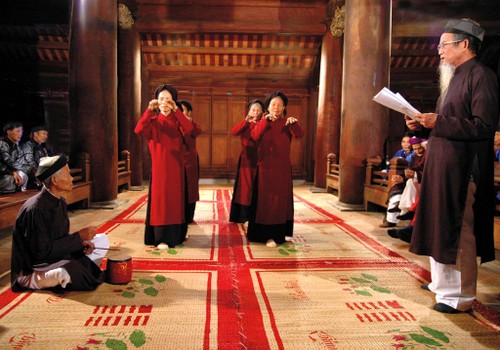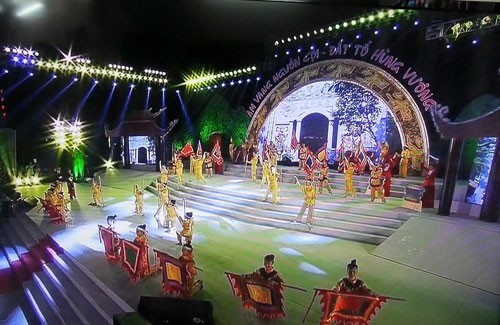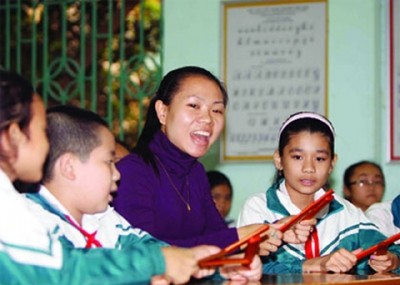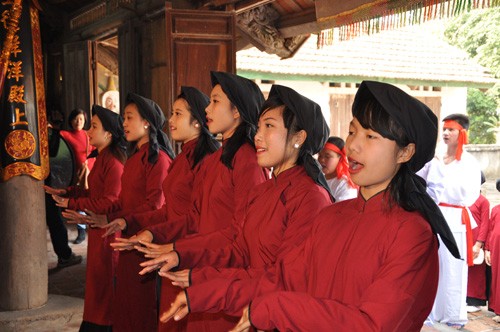(VOVworld) – Xoan singing is a typical cultural product of Phu Tho province, home to the 18 dynasties of Hung Kings, the legendary founders of Van Lang – the first known State of Vietnam. The local worship of the Hung Kings was officially recognized as an intangible cultural heritage of mankind by UNESCO in 2011. The preservation of Xoan singing is vital for developing Vietnam’s cultural identity.

A Xoan performance in the traditional festival in Phu Tho (Photo: vietnamtourism.com)
|
This year’s Hung Kings’ death anniversary and Hung Kings’ Temple Festival coincide with the fourth anniversary of UNESCO’s recognition of Xoan singing as an Intangible Cultural Heritage in Need of Urgent Safeguarding.

The “Resounding roots” performance kicks off the special art program, themed "Resounding roots of the Ancestral Land" to celebrate the 2015 Hung Kings Worship Ritual and Hung King's Temple Festival. (Photo: vanhien.vn)
|
To mark the event, various celebratory activities will be held to promote the singing and help people nationwide better understand the culture of the land of the Hung Kings.
A Phu Tho Folk Songs Festival held at the Hung Kings’ Temple Complex will feature Xoan guilds and clubs of Xoan singing and other folk song genres. A performance of Xoan singing by children and teenagers will be held in Viet Tri, the capital city of Phu Tho. The program will show how the singing has been handed down and spread among younger generations.
This is one of several activities the Phu Tho authorities have organized to preserve the genre, according to Ha Ke San, Vice Chairman of the Phu Tho provincial People’s Committee.
San said under the program, “Phu Tho has trained 62 artisans and organized 101 community-based courses, excluding training courses in schools. We strongly believe that this effort will help to get Xoan singing removed from the UNESCO’s list of endangered cultural heritages.”
Music researcher Dang Hoanh Loan, who has been directly involved in the program “Preserving, training, and practicing Phu Tho Xoan singing” in the 4 years since the art form was recognized by UNESCO, says:
“The province has successfully developed a class of Xoan listeners by organizing many clubs to teach them to sing and listen to Xoan songs. Expanding the number of listeners is the most important way to maintain a musical art form. Otherwise, it would be a dead art. And Phu Tho has been successful in this effort.”
Under this program, students have learned the main features of Xoan singing from artisans of the original Xoan singing communities. Phu Tho province has conferred the title of Xoan artisan on those who have contributed to restoring and preserving this intangible cultural heritage and to upgrading temples and communal houses which can provide performance venues.
 |
| Teaching Xoan singing for pupils of Tho Son Primary School in Viet Tri City, Phu Tho province. (Photo: Viet Cuong) |
Musician Loan gives additional details about the program: “Phu Tho’s People’s Committee and the Culture and Sports Department have implemented the national program of preserving and developing Xoan singing. First the province completed the restoration of Lai Len Shrine, which was believed to be the place where a Hung King taught Phu Tho residents to sing Xoan. The restoration of Lai Len Shrine meant the restoration of a performing space for Xoan singing.”
The revival of Xoan singing after the shrine’s restoration was the result of a joint effort by the provincial administration and local citizens to preserve their traditional culture.
 |
| Phu Tho is working hard to lift Xoan singing urgent safeguarding status as soon as in 2016. |
Associate Professor Nguyen Binh Dinh, Director of the Vietnam National Academy of Music, said: “we’ve revitalized almost all the main forms of Xoan singing. In Phu Tho there remain many materials, temples, and shrines relating to the heritage and a number of artisans who are skilled and have a profound knowledge of Xoan singing. Provincial leaders and concerned parties have found ways to get Xoan singing into the school curriculum, set up clubs, and organize overseas performance tours to promote Xoan singing.”
This year Phu Tho will promote Xoan singing abroad to introduce foreign friends to the genre. During the 2016-2020 period, Xoan singing and Hung Kings worship rituals will be linked to tourism development through performances in Xoan singing guilds and at international cultural exchanges. Phu Tho will also promote Xoan singing via mass media through programs on the province’s e-portal in both Vietnamese and English.